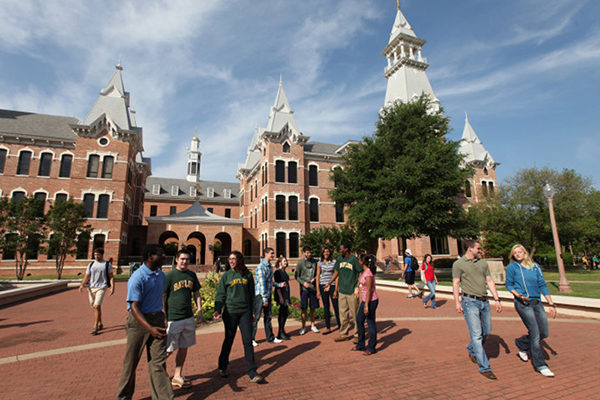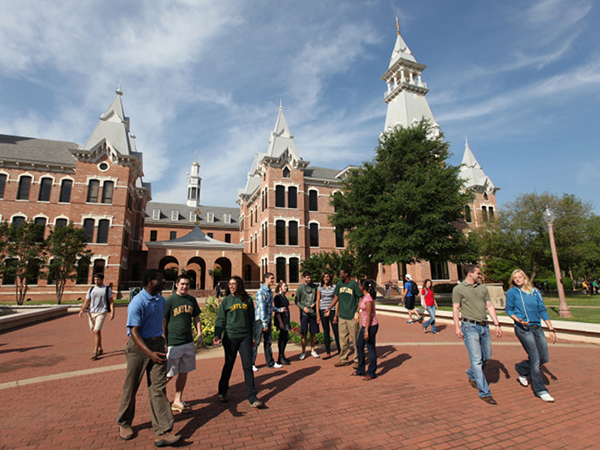Buried 14 paragraphs into a lengthy news release about the spring Baylor board of regents meeting was a notice of approval for “guiding principles” of “caring for all students, including LGBTQ students.”
The news didn’t stay buried for long, however, as Baylor’s critics from the right immediately pounced on and extrapolated from the news item evidence of the Baptist school’s perceived capitulation to liberalism.
Al Mohler, defender of the official faith of the Southern Baptist Convention, tweeted: “This is a picture of institutional capitulation disguised as care. Accepting a chartered student organization identified as LGBTQ is incompatible with holding to biblical convictions. The great surrender continues.”
“This is a picture of institutional capitulation disguised as care.”
LGBTQ advocates at Baylor wish Mohler’s premise of their acceptance was right. But they don’t quite feel that welcome just yet.
The official news release said: “The board charged the president and university administration to determine the appropriate pathways to provide additional care, connections and community for Baylor’s LGBTQ students, including the possibility of establishing a new, chartered student group that is consistent with Baylor’s core commitments and the university’s policies and statements.”
If LGBTQ advocates among Baylor’s students, faculty and alumni have anything to celebrate from the regents’ announcement, it is the word “possibility,” which is, in fact, progress compared to the brick wall they believe the university previously has erected to prevent an LGBTQ-friendly student group on campus.
An unofficial student group called Gamma Alpha Upsilon has unsuccessfully sought a charter from the university for about 10 years.
Affirming ‘traditional’ sexuality
The news release said Baylor “continues to place a priority on care for all students while rooted in its Baptist beliefs and traditional biblical understanding of human sexuality.” That means that “sexual relations of any kind outside of marriage between a man and a woman are not in keeping with the teaching of Scripture, as summarized in the university’s Statement on Human Sexuality.”
Sandwiched around that reminder were two more affirming bullet points. One noted “the dignity and worth of all, regardless of sexual orientation or gender identity.” The other declared a “commitment to providing a welcoming, supportive educational environment based on civility and respect for all.”
“Baylor affirmed a biblical view of sexuality without compromise in this statement.”
Arlington, Texas, pastor Dwight McKissic, who has become a fierce critic of Mohler but does not advocate for LGBTQ inclusion, challenged Mohler via Twitter response: “Baylor affirmed a biblical view of sexuality without compromise in this statement. (Southern Baptist Theological Seminary) accommodated you as president affirming the Lost Cause Theory & permitted Paul Pressler to declare ‘the wrong side won the civil war,’ without any public reprimand. Jesus showed compassion.”
But national commentator Rod Dreher, writing in The American Conservative, joined Mohler in blasting Baylor: “Well, Baylor University did what it was always going to do, and caved.”
He continued: “Seriously, the language Baylor’s document uses to rationalize the university’s capitulation is a perfect example of the therapeutic approach that soft totalitarianism uses to institute itself.”
Dreher then predicted Baylor is headed straight down the slippery slope of liberalism: “Give it a few years, and the next step is to declare that any professors or staffers who hold to the orthodox Christian teaching on sex and sexuality must be suppressed as a necessary step to protect LGBT persons from harm.”
‘First step on a long road’
The independent group BU Bears for All, an LGBTQ-advocacy group, issued a statement expressing gratitude for the small sign of progress from the regents’ resolution: “We appreciate that the university and board of regents have acknowledged that all students, regardless of sexual orientation or gender identity, are made in the image of God and entitled to equal dignity and respect, including on Baylor’s campus.”
However, the group noted that Baylor’s LGBTQ students “have tried for years to charter their own student organization” without success. The board’s announcement of a possible pathway for such a student organization “represents a first step on a long road.”
The university released a digital flyer titled “A Guide to the Decision of the Baylor Board of Regents to Strengthen Care for LGBTQ+ Students on Campus.” In a question-and-answer section, this document explains how the university would approach chartering a new student group.
“Baylor administrators will approach this work with a spirit of grace and truth, just as Jesus did. We will start anew in working with students to explore establishing a chartered LGBTQ+ student group consistent with the core beliefs and values of the university and its board and administration.”
Those core beliefs would require the student organization to adhere to — and not oppose — the university’s Statement on Human Sexuality, which declares that Christian churches “have affirmed purity in singleness and fidelity in marriage between a man and a woman as the biblical norm,” and that students are expected to “not participate in advocacy groups which promote understandings of sexuality that are contrary to biblical teaching.”
“We will start anew in working with students to explore establishing a chartered LGBTQ+ student group consistent with the core beliefs and values of the university and its board and administration.”
That could mean an LGBTQ student group would be required to be silent about federal law that allows same-sex marriage and agree not to promote any understanding of human sexuality other than the university’s stated position.
Baylor named in lawsuit
Baylor is among 25 faith-based universities that were named in a March lawsuit filed against the U.S. Department of Education. That suit alleges misuse of taxpayer dollars through grants and scholarships given to schools that have been given special waivers to continue discriminatory practices against LGBTQ students. The suit specifically targets the “religious exemption” Baylor and similar schools have from the Department of Education.
While not addressing that lawsuit directly, Baylor’s informational piece cites concerns about the mental health and well-being of LGBTQ students. It also notes that “federal and state guidance on LGBTQ+ rights continues to evolve; however, we must do what we believe is right for our students and provide them the best opportunity for success at Baylor.”
Behind the scenes, some Baylor insiders charge the university effectively has a double standard on sexual activity, focusing more heavily on preventing or disciplining same-sex sexual activity than opposite-sex sexual activity.
Over the past decade, national surveys of college students have found a high percentage — even of self-identified Christian students — are sexually active. While researchers have noted a slight increase in the percentage of college-age students who are abstinent, they remain a minority.
This places faith-based schools like Baylor in a position of needing to assure parents, donors and potential critics that they are holding the line against perceived sexual immorality.
Walking the line with Texas Baptists
Although managed by a self-perpetuating board of regents, Baylor remains affiliated with the Baptist General Convention of Texas, which has taken consistently conservative stances on anything related to sexuality. The BGCT has passed resolutions about marriage and sexuality and has kicked out churches that stray from its views.
The BGCT has passed resolutions about marriage and sexuality and has kicked out churches that stray from its views.
On its website page devoted to frequently asked questions about human sexuality, Baylor begins in the first sentence by explaining its affiliation with Texas Baptists: “In keeping with Baylor University’s Christian mission and its historic partnership with Texas Baptists, all members of the university community are encouraged to consider and respect the teachings of Jesus and the beliefs common to the Christian church. As indicated in Baylor’s Statement on Human Sexuality, ‘The University affirms the biblical understanding of sexuality as a gift from God. Christian churches across the ages and around the world have affirmed purity in singleness and fidelity in marriage between a man and a woman as the biblical norm.’”
The seminary and sexuality
Baylor’s stance has other repercussions because the university houses its own seminary. George W. Truett Theological Seminary trains clergy for service in the church and community and has staked out a centrist position in the marketplace of Baptist theological education.
While some other U.S. seminaries now openly welcome LGBTQ students and bless same-sex marriage, Truett is not among them. In fact, the seminary has in the past revoked scholarships for students from affirming congregations because the scholarships were funded by Texas Baptists.
In addition to the university’s statement on human sexuality, the seminary has its own version within its Statement of Common Faith: “We believe, on the basis of biblical teaching and together with the vast majority of Christians throughout the ages, that sex is intended by God solely for marriage between one man and one woman.”
Another seminary document, “Vision for Life Together,” also addresses sexuality: “We thus affirm the gifts of singleness and marriage as distinct and complementary signs of the kingdom, the first as a sign of freedom for the gospel and kingdom life, and the second as the mystery in which a husband and a wife become one flesh. This life-long union was pronounced as good by God at creation and as sacred by the Lord Jesus in the Gospels, and from this union children are received and welcomed into our world. We strive to commit ourselves to faithfulness and celibacy in singleness and to faithfulness and fidelity in marriage, recognizing marriage as the covenantal context in which the physical union of man and woman is divinely ordained and rightly expressed.”
Truett Seminary Dean Todd Still sent an email to Truett faculty, staff and Board of Advocates May 17 assuring them that “Baylor’s position and policy on human sexuality have not changed.”
Possible recognition of a chartered student group on campus “will not be Gamma Alpha Upsilon,” he said. “Neither would it be an advocacy group, per the university’s Statement on Human Sexuality.”
“Baylor’s position and policy on human sexuality have not changed.”
Acknowledging that Baylor’s critics from the right are misrepresenting the board of regents’ action, he explained: “At Truett, we will continue to embrace and espouse our Statement of Shared Beliefs” as well as the university’s Statement on Human Sexuality. He also indicated his openness to discuss the issue with anyone who has concerns or questions.
Another Texas Baptist school, Hardin-Simmons University, recently closed its Logsdon Seminary at least in part due to criticisms from conservative West Texas pastors that the seminary did not take a hard line against LGBTQ inclusion. While university administrators said the seminary’s closure was for financial reasons, alumni, faculty and staff have denied that was the real reason.
As Baylor’s conversation about caring for LGBTQ students carries on across the university constituency, the fact that it has a seminary among its various schools of study likely will shape the outcome in some way.
Related articles:
25 faith-based schools named in LGBTQ discrimination case against Department of Education
Baptist schools seek waiver from LBGT discrimination ban
LGBTQ-friendly student group, alumni vow to fight for inclusion at Baylor
Losing Logsdon Seminary: broken commitments and wounded spirits | Opinion by Rob Sellers


